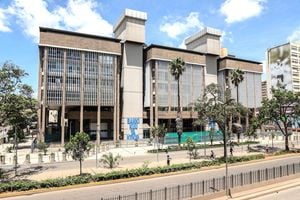
Nairobi Securities Exchange (NSE) on the trading floor of the Exchange building.
The Capital markets Authority (CMA) has offered an opportunity for companies going public through an initial public offering (IPO) to support their share prices for up to 30 days after listing.
Companies going public via introduction or IPO – where they raise new capital by selling shares — have so far left their stocks to trade based on supply and demand on the Nairobi Securities Exchange (NSE).
This presents the risk of a sharp share price fall soon after listing, exposing companies to negative publicity and reduced investor confidence.
The CMA said in a gazette notice dated October 27, 2023 that companies going public through an IPO can now hire a price stabilising agent (typically an investment bank) to buy shares in the market and thereby support the stock price in the initial trading days.
Investment banks usually charge a fee for the price stabilisation role and other functions such as valuation and marketing of the IPO.
“An issuer making a public offer of securities may provide a green shoe option in order to benefit from the demand for the securities if there is an oversubscription or to stabilise the post-listing price of the securities,” the regulator said.
The stabilising agent can also sell shares to slow down a rally in the share price. Companies are, however, mostly concerned about falling share prices and a rally is universally welcomed by founding shareholders as well as those who buy the stock upon listing.
Safaricom, which holds the record of Kenya largest IPO, witnessed a share fall price decline soon after listing on June 9, 2008.
This disillusioned many retail investors who sold their holdings at a loss. The telco offered its shares at a price of Sh5 each. The stock rallied to Sh7.35 on the first trading day but quickly embarked on a decline that saw it close at Sh6.2 on the 30th trading day.
It would continue to fall below the IPO price, reaching lows of Sh2.6 in September 2008. The company’s share price later recovered to stage one of the biggest rallies on the NSE, climbing above Sh44 in August 2021. Analysts hold differing views of the benefits of an IPO price stabilisation.
Some say it will bring confidence to the market while others say speculation is a feature of the market that should not be managed.
“I think it is a good move. It can work. It is important because it gives confidence to IPO investors that there is a mechanism to ensure capital gains after the IPO and it also gives confidence to the issuers that their issues can better be subscribed,” said an analyst who declined to be quoted.
Others say the price stabilisation is likely to attract short-term traders to an IPO. They also say it may not be possible to support a share price should there be a large number of sellers.
“I’m of the view that speculation is part of the market, and it creates opportunities. So, the solution lies in investor education and not in the price stabilisation agency so that people are aware of what to buy and when to buy and to understand the behaviour of prices in relation to market sentiments and fundamentals of the companies they are investing in,” another analyst said.
“It is important to allow people to understand the whole process of trading in shares and not to stabilise the price. I’m curious to know to what extent they are able to stabilise the share price. I’m a bit sceptical with this move and I think the solution lies in investor education and not the stabilising agents.”
According to the CMA, potential issuers shall be required to lodge offer documents with the regulator after the stabilising agent has entered into an agreement with the promoters (pre-issue shareholders).
“The stabilising agent shall determine the relevant aspects, including the timing of buying or selling the securities, quantity to be bought or sold and the price at which such securities may be bought or sold in the market,” the regulator said.
The stabilising agent shall open a special account with a licensed bank for crediting any monies received for the over-allotment and a special account with a central depository agent (CDA) for crediting specified securities to be bought from the market during the stabilisation period out of the monies credited in the special bank account.
The stabilisation process shall be available for a period of not more than 30 days from the date on which trading in the shares in the secondary market of the NSE commences.
“Upon expiry of the stabilisation period, if the stabilising agent has not been able to buy the specified shares from the market to the extent of such shares over-allotted, the issuer shall allot specified shares at issue price to the extent of the shortfall to the special account with the central depository agent,” said the CMA.
Any monies left in the special bank account after remittance to the issuer and deduction of expenses incurred by the stabilising agent shall be transferred to the Investor Compensation Fund (ICF) and the special bank account shall be closed.






